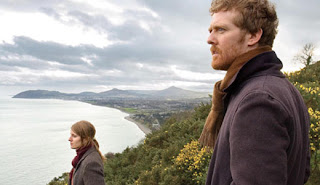One of cinema's true auteur's, Terrence Malick has directed 5 features in nearly 40 years as film-maker with a 20 year hiatus between his second film Days of Heaven in 1978 and 1998's WW2 epic The Thin Red Line for good measure. His work has a tendency toward emphasising the stark beauty of the natural world over the flawed nature of human beings and sparse dialogue. Today's flick of the day is his remarkably self assured début Badlands, based loosely on the 1958 murder spree of Charles Starkweather.
Narrated by Holly, played by a very young Sissy Spacek, a young girl who lives with her violent and overbearing father in small town America in the 1950s. One day she meets and ultimately falls in love with rebellious loner Kit, played by the always superb Martin Sheen. Her father, played by Warren Oates perhaps one of the terminally underrated actors of his generation, attempts to drive them apart so in a cold manner Kit shoots him and together the pair hit the road. As they cross the empty plains of the Dakota's, Holly narrates their story like some poetic love story while Kit leaves bodies in his wake everywhere they go. Holly's flowery narration is in stark contrast to the murderous Kit and the beautiful visuals of the American midwest. Eventually their murderous actions lead to a fitting denouement.
While the actions of Kit and Holly are dealt with in a casual manner, Malick is careful never to glamorise them or their predicament but there is no moral judgement. There is also no sensationalism which is something many directors would surely have surrendered themselves to. If anything the film is low-key in dealing with its murderous pair. Malick offers no explanation for their actions and it is tempting to believe from Sheen's bravura performance that it is out of boredom and adolescent ennui as anything else.
Along with Malick's fantastic visual style, the real star of the film is Martin Sheen. His film is perfectly measured, capturing the studied attempt at James Dean rebellious cool that is Kit. Kit is so busy trying to look cool that he doesn't seem to have time to feel emotions like a normal being. Indeed his cold demeanour is chilling in its way just because of its banality and very much a counterpoint to the girlish naivety of Spacek's Holly.
Badlands is Malick's best film perhaps because it manages to catch the right balance between the quiet beauty of his visual impulses and narrative tedium, something which could not be said for 2005's The New World, perhaps the dullest couple of hours I have spent in front of a screen. Made for less than $500,000 in 1973 after Malick had spent one year at film school it stands out today for its style, performances and elegiac beauty and as such is one of the defining films of its generation.


.jpg)
.jpg)




.jpg)
.jpg)





poster.jpg)


.jpg)

.jpg)

.jpg)